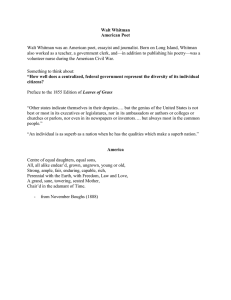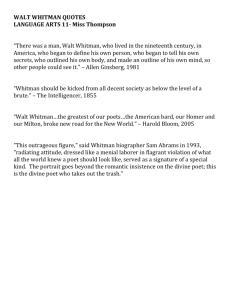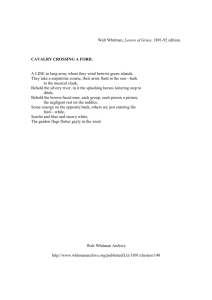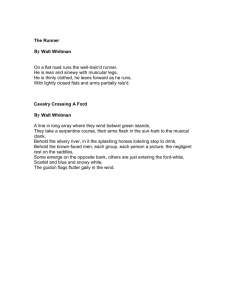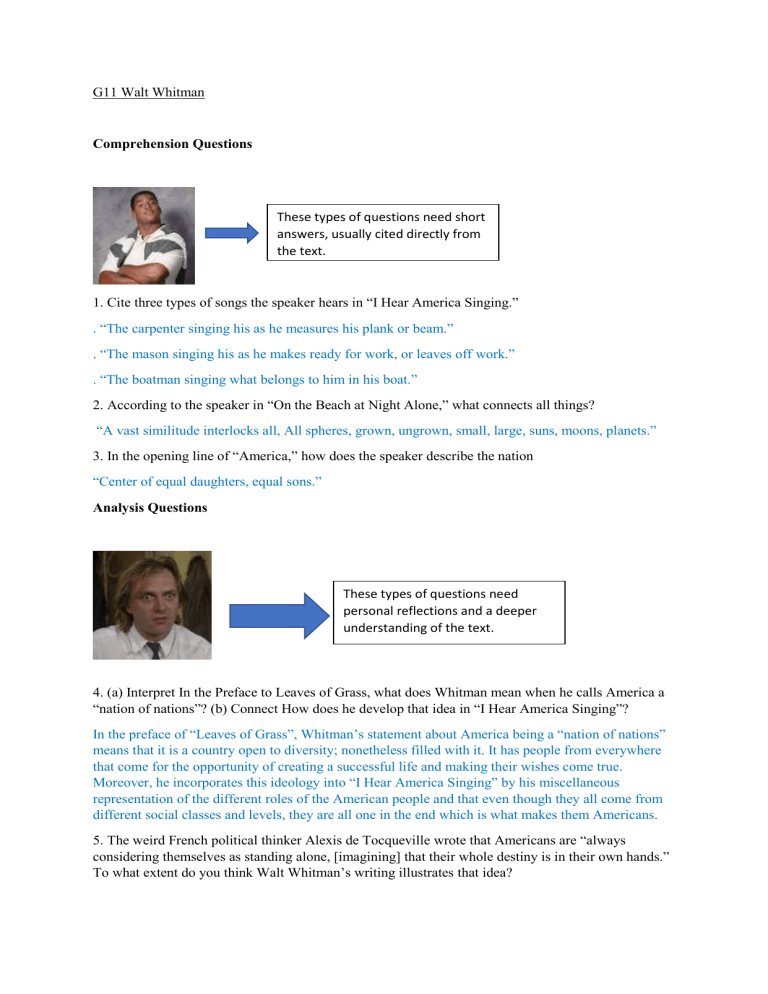
G11 Walt Whitman Comprehension Questions These types of questions need short answers, usually cited directly from the text. 1. Cite three types of songs the speaker hears in “I Hear America Singing.” . “The carpenter singing his as he measures his plank or beam.” . “The mason singing his as he makes ready for work, or leaves off work.” . “The boatman singing what belongs to him in his boat.” 2. According to the speaker in “On the Beach at Night Alone,” what connects all things? “A vast similitude interlocks all, All spheres, grown, ungrown, small, large, suns, moons, planets.” 3. In the opening line of “America,” how does the speaker describe the nation “Center of equal daughters, equal sons.” Analysis Questions These types of questions need personal reflections and a deeper understanding of the text. 4. (a) Interpret In the Preface to Leaves of Grass, what does Whitman mean when he calls America a “nation of nations”? (b) Connect How does he develop that idea in “I Hear America Singing”? In the preface of “Leaves of Grass”, Whitman’s statement about America being a “nation of nations” means that it is a country open to diversity; nonetheless filled with it. It has people from everywhere that come for the opportunity of creating a successful life and making their wishes come true. Moreover, he incorporates this ideology into “I Hear America Singing” by his miscellaneous representation of the different roles of the American people and that even though they all come from different social classes and levels, they are all one in the end which is what makes them Americans. 5. The weird French political thinker Alexis de Tocqueville wrote that Americans are “always considering themselves as standing alone, [imagining] that their whole destiny is in their own hands.” To what extent do you think Walt Whitman’s writing illustrates that idea? I suppose that Walt Whitman’s writing doesn’t completely sustain Alexis’s perception since even though Americans rely on their democracy and freedom greatly, to be capable to build their own future based on their own dreams; they take on these assets as a whole. Moreover, Americans look for the good in America as a nation, and strive for acceptance, progressiveness, equality, love, faith, and prosperity in each citizen. This is shown in the following lines, “All, all alike endear’d, grown, ungrown, young or old, Strong, ample, fair, enduring, capable, rich, Perennial with the Earth, with Freedom, Law and Love.” However, a possible reason behind American’s devotion towards their country is the fear of losing their identity considering that America is a country with many different cultures and nationalities. So, to them, building a life where each person has free will and is capable of expressing his/her feelings, that is what binds them together and makes them Americans. 6. Connect something Whitman said in his poems to a theme in either the Declaration of Independence or Bill of Rights. In the Declaration of Independence and Bill of Rights, Whitman focuses on the entitlement of American citizens to their rights and for the undeniable acceptance and democracy of each and every citizen no matter the race, religion, and class. This connects to Whitman’s poems through the theme of the free will of every American because thats what shapes their identity. This is shown in the following lines, “Center of equal daughters, equal sons, All, all alike endear’d, grown, ungrown, young or old, Strong, ample, fair, enduring, capable, rich.” RESEARCH – Choose one option A - Research to Clarify Choose at least one unfamiliar detail from the text. Briefly research that detail. In what way does the information you learned shed light on an aspect of Walt Whitman’s work? Adamant (adjective): Refusing to be persuaded or to change one's mind. B - Research to Explore Conduct research to find out why Whitman was regarded as a revolutionary writer in his time.
